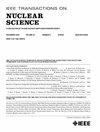表征温度对光耦合器辐射诱导降解的影响
IF 1.9
3区 工程技术
Q3 ENGINEERING, ELECTRICAL & ELECTRONIC
引用次数: 0
摘要
本研究通过测量商用 4N49 光耦合器在不同温度下的响应,研究了辐射对其造成的影响。被测设备(DUT)受到一系列总剂量的辐射。在每个累积剂量下,器件在-25 °C到100 °C之间的几个温度下进行表征。结果表明,辐照对发光二极管(LED)没有负面影响。光电晶体管的电流增益在辐照后显著下降。在基极电流不变的情况下,增益衰减随温度升高而增加。光耦合器的电流传输比(CTR)在辐照后下降,这主要是由于光电晶体管的增益衰减造成的。辐射引起的参数衰减与温度的关系随总电离剂量(TID)和发光二极管的正向电流而变化。具体来说,在极低的 LED 正向电流和较高的温度下,会观察到光响应的异常增加,这是由于光电晶体管的集电极-基极(CB)结的反向漏电流增加所致。本文章由计算机程序翻译,如有差异,请以英文原文为准。
Effect of Characterization Temperature on the Radiation Induced Degradation of Optocouplers
This study examines the radiation-induced effects on commercial 4N49 optocouplers by measuring their response at different temperatures. The devices under test (DUTs) are subjected to a series of total doses. At each accumulated dose, the devices are characterized at several temperatures between -25 °C and 100 °C. The results demonstrate that irradiation has no negative effects on the light-emitting diode (LED). The current gain of the phototransistor decreases significantly after irradiation. For a constant base current, the gain degradation increases with increasing temperature. The current transfer ratio (CTR) of the optocoupler decreases after irradiation, which is dominated by the gain degradation of the phototransistor. Temperature dependence of the radiation-induced parametric degradation varies with the total ionizing dose (TID) and the forward current of the LED. Specifically, an unusual increase in the photoresponse is observed at extremely low LED forward current and high temperature, which originates from the increased reverse leakage current of the collector-base (CB) junction of the phototransistor.
求助全文
通过发布文献求助,成功后即可免费获取论文全文。
去求助
来源期刊

IEEE Transactions on Nuclear Science
工程技术-工程:电子与电气
CiteScore
3.70
自引率
27.80%
发文量
314
审稿时长
6.2 months
期刊介绍:
The IEEE Transactions on Nuclear Science is a publication of the IEEE Nuclear and Plasma Sciences Society. It is viewed as the primary source of technical information in many of the areas it covers. As judged by JCR impact factor, TNS consistently ranks in the top five journals in the category of Nuclear Science & Technology. It has one of the higher immediacy indices, indicating that the information it publishes is viewed as timely, and has a relatively long citation half-life, indicating that the published information also is viewed as valuable for a number of years.
The IEEE Transactions on Nuclear Science is published bimonthly. Its scope includes all aspects of the theory and application of nuclear science and engineering. It focuses on instrumentation for the detection and measurement of ionizing radiation; particle accelerators and their controls; nuclear medicine and its application; effects of radiation on materials, components, and systems; reactor instrumentation and controls; and measurement of radiation in space.
 求助内容:
求助内容: 应助结果提醒方式:
应助结果提醒方式:


